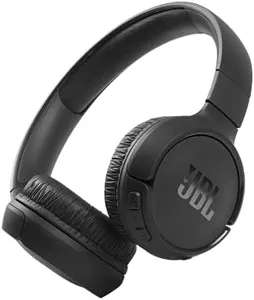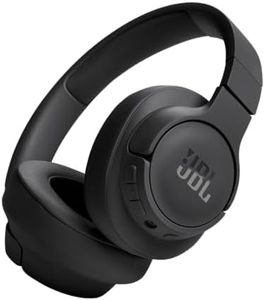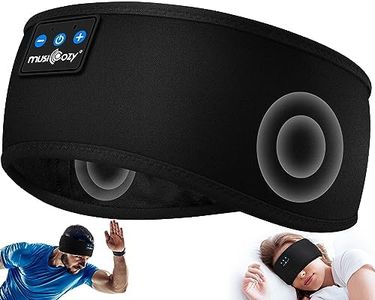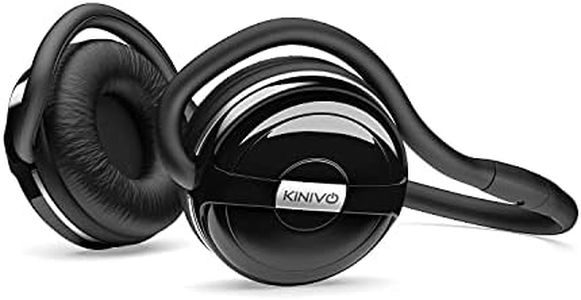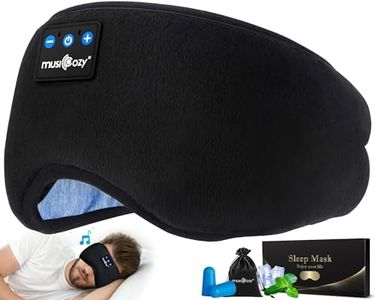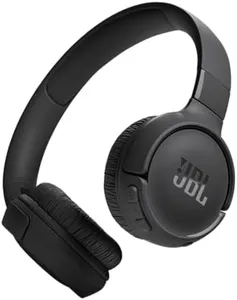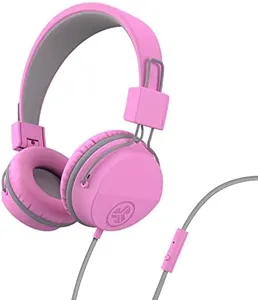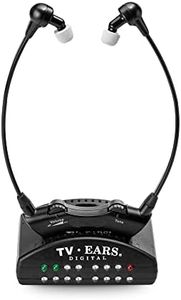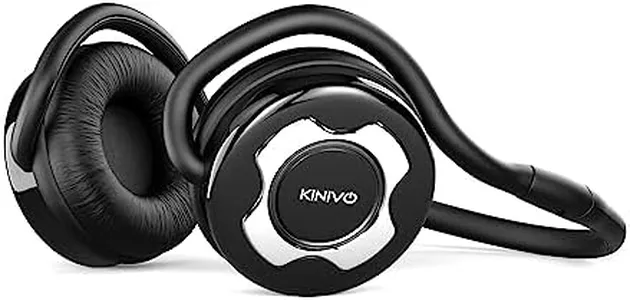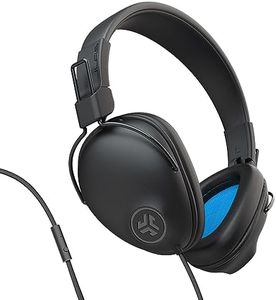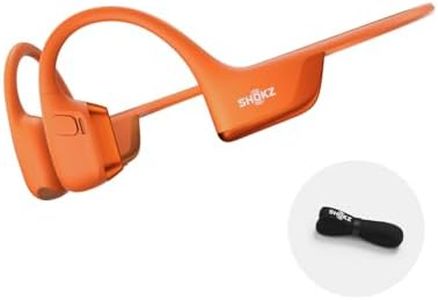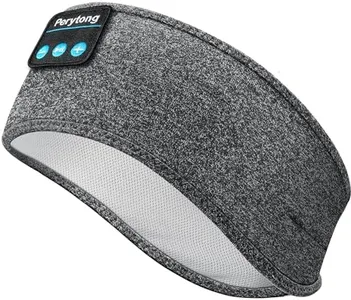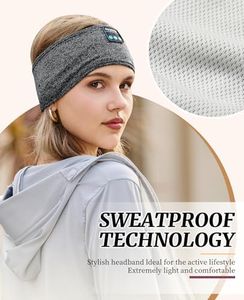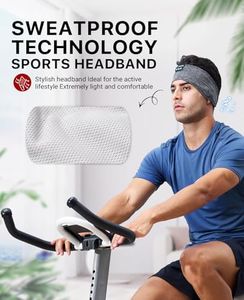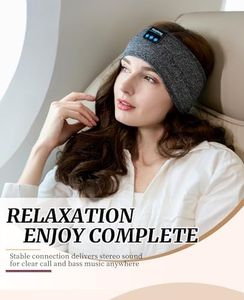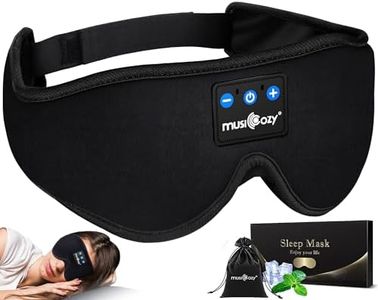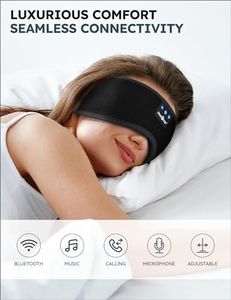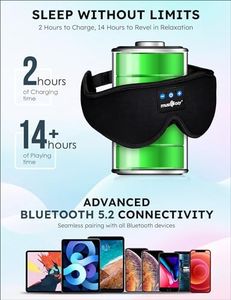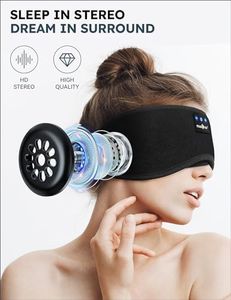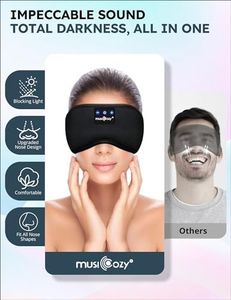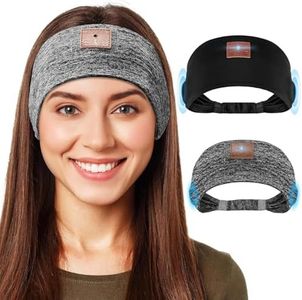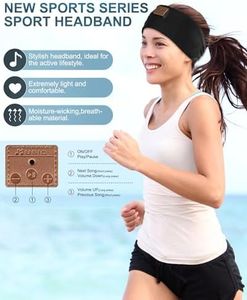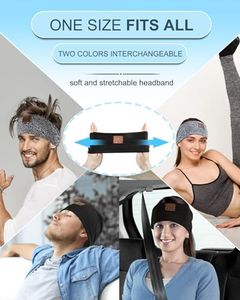10 Best Headband Headphones 2025 in the United States
Winner
JBL Tune 510BT - Bluetooth headphones with up to 40 hours battery, microphone for call, foldable and comfortable, Android and iOs compatible (Black)
The JBL Tune 510BT headphones present a solid choice for users seeking a comfortable and versatile audio experience. One of the standout features is the JBL Pure Bass sound, which delivers a rich audio experience that users appreciate, especially for music lovers. The headphones also shine with an impressive battery life of up to 40 hours, allowing for extended listening sessions without frequent recharging—great for those who are always on the go. Additionally, the quick charge feature enables you to get 2 hours of playback from just a 5-minute charge, which is particularly handy in a pinch.
Most important from
76143 reviews
JBL Tune 720BT - Wireless Over-Ear Headphones with JBL Pure Bass Sound, Bluetooth 5.3, Up to 76H Battery Life and Speed Charge, Lightweight, Comfortable and Foldable Design (Black)
The JBL Tune 720BT headphones offer a strong combination of sound and convenience, making them a solid choice for everyday wireless listening. Their JBL Pure Bass sound delivers deep, punchy bass that’s enjoyable for most music styles, although audiophiles might find the sound profile a bit bass-heavy. Comfort is well addressed by a lightweight and foldable design, which helps during extended wear and easy portability. However, the plastic build may not feel very premium or highly durable over long-term use.
Most important from
5015 reviews
MUSICOZY Sleep Headphones Bluetooth 5.4 Headband, Sports Wireless Earphones Sweat Resistant Earbuds Sleeping Headphone with Ultra-Thin HD Stereo Speaker for Workout Running Cool Gadgets Unique Gifts
The MUSICOZY Sleep Headphones are a unique blend of comfort and functionality, particularly suited for users who enjoy music while engaging in activities like jogging, yoga, or simply relaxing. The standout feature is its dual-purpose design as both a headband and headphones, allowing users to enjoy their tunes without the hassle of traditional headphones. The Bluetooth 5.2 technology provides a stable connection, enhancing user experience during workouts or outdoor activities.
Most important from
22856 reviews
Top 10 Best Headband Headphones 2025 in the United States
Winner
9.8 score
JBL Tune 510BT - Bluetooth headphones with up to 40 hours battery, microphone for call, foldable and comfortable, Android and iOs compatible (Black)
JBL Tune 510BT - Bluetooth headphones with up to 40 hours battery, microphone for call, foldable and comfortable, Android and iOs compatible (Black)
Chosen by 1408 this week
JBL Tune 720BT - Wireless Over-Ear Headphones with JBL Pure Bass Sound, Bluetooth 5.3, Up to 76H Battery Life and Speed Charge, Lightweight, Comfortable and Foldable Design (Black)
JBL Tune 720BT - Wireless Over-Ear Headphones with JBL Pure Bass Sound, Bluetooth 5.3, Up to 76H Battery Life and Speed Charge, Lightweight, Comfortable and Foldable Design (Black)
MUSICOZY Sleep Headphones Bluetooth 5.4 Headband, Sports Wireless Earphones Sweat Resistant Earbuds Sleeping Headphone with Ultra-Thin HD Stereo Speaker for Workout Running Cool Gadgets Unique Gifts
MUSICOZY Sleep Headphones Bluetooth 5.4 Headband, Sports Wireless Earphones Sweat Resistant Earbuds Sleeping Headphone with Ultra-Thin HD Stereo Speaker for Workout Running Cool Gadgets Unique Gifts
MUSICOZY Sleep Headphones Bluetooth 5.4 Headband Sleeping Eye Mask for Mom Women Men Wireless Music Earbuds Earphones for Side Sleepers Built-in HD Speakers Cool Gadgets Unique Gifts
MUSICOZY Sleep Headphones Bluetooth 5.4 Headband Sleeping Eye Mask for Mom Women Men Wireless Music Earbuds Earphones for Side Sleepers Built-in HD Speakers Cool Gadgets Unique Gifts
JBL Tune 520BT - Wireless On-Ear Headphones, Up to 57H Battery Life and Speed Charge, Lightweight, Comfortable and Foldable Design, Hands-Free Calls with Voice Aware (Black)
JBL Tune 520BT - Wireless On-Ear Headphones, Up to 57H Battery Life and Speed Charge, Lightweight, Comfortable and Foldable Design, Hands-Free Calls with Voice Aware (Black)
SHOKZ New OpenRun Pro 2 - Open-Ear, Bone Conduction Sport Headphones - with Headband - Sweat Resistant, Workout Headphones - Secure, Wireless, Comfortable Fit-Deep Bass and Smart Mic App
SHOKZ New OpenRun Pro 2 - Open-Ear, Bone Conduction Sport Headphones - with Headband - Sweat Resistant, Workout Headphones - Secure, Wireless, Comfortable Fit-Deep Bass and Smart Mic App
Perytong Sleep Headphones Wireless, Bluetooth Sports Headband Headphones with Ultra-Thin HD Stereo Speakers Perfect for Sleeping,Workout,Jogging,Yoga,Insomnia, Air Travel, Meditation
Perytong Sleep Headphones Wireless, Bluetooth Sports Headband Headphones with Ultra-Thin HD Stereo Speakers Perfect for Sleeping,Workout,Jogging,Yoga,Insomnia, Air Travel, Meditation
MUSICOZY Sleep Headphones, Bluetooth 5.4 Sleep Mask Headband Headphones Sleeping Eye Mask, Wireless Music Earbuds Earphones with HD Headphones Ultra-Thin Stereo Speakers for Side Sleepers Men Women
MUSICOZY Sleep Headphones, Bluetooth 5.4 Sleep Mask Headband Headphones Sleeping Eye Mask, Wireless Music Earbuds Earphones with HD Headphones Ultra-Thin Stereo Speakers for Side Sleepers Men Women
JBL Live 770NC - Wireless Over-Ear Headphones with True Adaptive Noise Cancelling with Smart Ambient, Up to 65 Hours of Battery Life, Comfort-fit Fabric Headband & Carrying Pouch (Blue)
JBL Live 770NC - Wireless Over-Ear Headphones with True Adaptive Noise Cancelling with Smart Ambient, Up to 65 Hours of Battery Life, Comfort-fit Fabric Headband & Carrying Pouch (Blue)
7.3 score
Mixiba 2-Pack Headband Headphones, Sleeping Headphones with Ultra-Thin HD Stereo Speaker, Bluetooth Headband Wireless for Sports, Workouts, Insomnia, Yoga, Air Travel, Meditation
Mixiba 2-Pack Headband Headphones, Sleeping Headphones with Ultra-Thin HD Stereo Speaker, Bluetooth Headband Wireless for Sports, Workouts, Insomnia, Yoga, Air Travel, Meditation
Our technology thoroughly searches through the online shopping world, reviewing hundreds of sites. We then process and analyze this information, updating in real-time to bring you the latest top-rated products. This way, you always get the best and most current options available.

